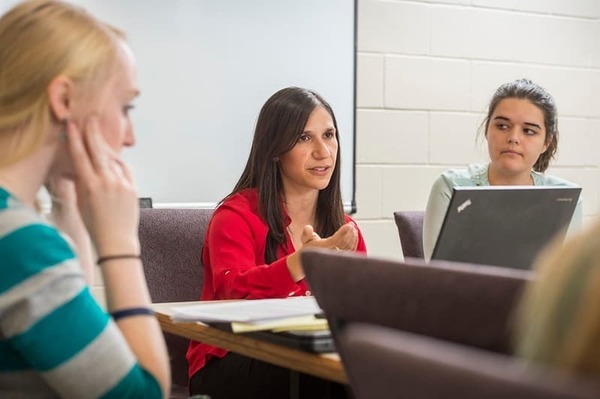Clinical Training Model
Integrating Science and Practice

Training in the clinical psychology area at Notre Dame is built on a clinical science model. This model emphasizes empirically supported assessment and diagnosis and focuses on understanding the descriptive structure, processes, and mechanisms underlying psychopathology and its assessment and treatment in children, adolescents, and adults.
The training provides students with:
- sophisticated skills in clinical research methods and advanced statistical methods
- the expertise necessary to conduct research on psychopathology assessment, risk and resilience factors for psychopathology, and the efficacy of interventions for preventing and treating psychopathology, and
- the knowledge needed for thoughtful dissemination of research findings to the broader psychological and lay communities.
In general, training in the Notre Dame clinical psychology area prepares students to be psychologists whose professional influence is rooted in the broad integration of science and practice. We anticipate that graduates of the clinical area will contribute to the discipline and to society through commitment to research and scholarship. Although general features of the clinical area’s science and practice training components are described below separately, they are conceptualized as being highly intertwined and mutually reinforcing.
Training in Science
Research training is based on a mentorship model in which students and faculty work together to pursue shared research interests. In addition, the clinical area draws on the research strengths of the psychology department as a whole to provide students with experiences in a broad range of methodological approaches and statistical procedures necessary for studying psychopathology and its assessment, prevention, and treatment in children, adolescents, and adults in multiple settings.
Building the foundation to conduct sound research begins in the first year with a two-semester sequence on Quantitative Methods and initiation of a first-year research project. Working closely with a faculty advisor throughout their graduate-student careers, students complete a minimum of two additional research projects—an M.A. thesis and a doctoral dissertation—as well as a comprehensive review paper. In support of later pursuit of academic careers, students are expected to disseminate their research findings in professional and community settings, and are supported fully in their efforts to publish, obtain external funding, and teach.
Training in Practice
In keeping with its clinical science orientation, the clinical area concentrates on the training of research scholars and provides focused attention to developing clinical skills.
Through coursework and practicum experiences, and guided by intensive supervision, clinical area students develop a framework and the requisite skills for success in their practicum placements, clinical internship year, and career.
Students are prepared to be effective professionals with a wide variety of clients and client systems and to implement evidence-based assessments and effective treatments. In every clinical endeavor, we support:
- Multicultural understanding of the client and the therapeutic relationship
- Implementation and/or adaptation of empirically supported assessments and interventions
- The use of designs and methodologies that provide empirical evidence for the validity of the assessments administered and the effectiveness of the treatments provided.
During their graduate training, students develop high-quality clinical skills sequentially and progressively. This dedication to quality begins with the Clinical Skills and Interventions course in the first year. The course provides students with fundamental interviewing and clinical skills and is a prerequisite to the practicum placements that begin in the second year. During the first year as well, all clinical area students take a two-semester sequence on psychological assessment, and Intervention Science.
The clinical area emphasizes the research foundations of clinical practice in both its curriculum and its assorted practicum opportunities. Clinical experiences are available through the University Counseling Center and various community agencies, including Memorial Epworth Center, the Notre Dame Legal Aid Clinic, Oaklawn Community Mental Health Center, and VA Medical Centers in both Michigan and Indiana.
Students’ training at the University Counseling Center focuses on such issues as social relations, alcohol abuse, family conflict, and performance enhancement. Under extensive professional supervision, students treat clients suffering from depression, anxiety, and other psychological problems.
Students also receive training at community agencies that afford opportunities for clinical assessment, access to diverse clinical populations, and working with a wide range of psychological problems. In various practicum settings, students may have the opportunity to assist in the development and evaluation of outreach and prevention programs.